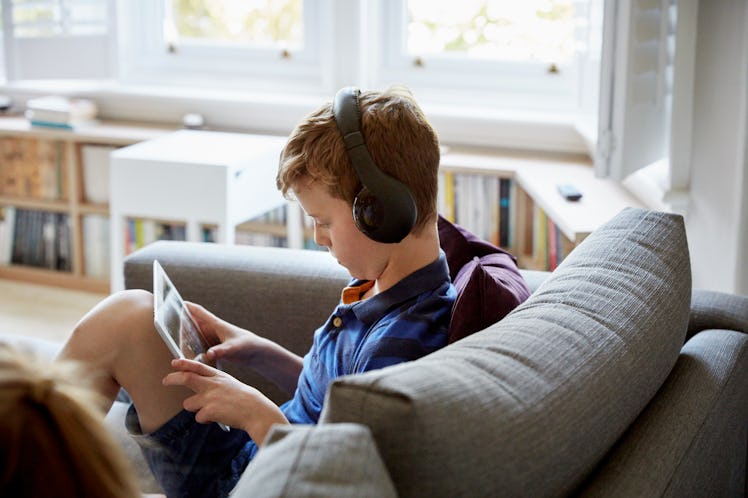Screen Time In 9-, 10-Year-Olds Linked To OCD Two Years Later, Study Says
Kids who spent more time with screens were more likely to have OCD symptoms two years later.

Although some screen time is a necessary evil for keeping kids busy and entertained — and activities such as video-chatting may even be beneficial for them — research has also found links between using screens and issues such as developmental delays in young kids. Recently, a new study added yet another reason to take away your child’s tablet, as researchers found a connection between time spent staring at screens and symptoms of obsessive-compulsive disorder (OCD).
This research doesn’t necessarily mean that screen use is causing OCD in kids, but it does prompt questions about the relationship between screens and kids’ mental health.
“Everyone, including teenagers these days, is experiencing unprecedented levels of screen exposure,” says Jason Nagata, M.D., a researcher on the study and a pediatrician at the University of California, San Francisco. “Learning how to optimize one's own screen use to maximize your mental health and wellbeing — and minimize any potential risks — is really important for everyone.”
For the study, researchers used data from thousands of kids in an ongoing ten-year survey in the U.S., which included data on mental health and time spent on screens doing things such as playing games or texting. Overall, they found that kids who reported more screen time at ages 9 to 10 were more likely to have newly developed symptoms of OCD two years later.
The researchers found a link between time spent playing video games and watching online videos, specifically, and new OCD symptoms. Other specific screen time activities — watching TV, texting, video chatting, and social networking — weren’t significantly connected to new OCD symptoms.
OCD is characterized by recurring thoughts or behaviors that a person isn’t always able to control, according to the National Institute of Mental Health. For instance, someone might have a recurrent fear of sickness, or a compulsive need to clean or double-check that the oven is off. Other symptoms can include recurring aggressive thoughts, recurring thoughts about taboo subjects such as religion or sex, or tics that include repeating certain movements or sounds.
Not every kid who watches online videos or plays video games is going to develop OCD, Nagata explains, but both playing video games and watching online videos are risk factors.
One theory the researchers floated about the reason behind this is that playing video games could emphasize perfectionism, such as the need to earn a higher score. They also speculated that because algorithms and advertising can steer people toward watching the same kind of content over and over, watching videos online could spur “compulsive viewing of homogenous content.” For example, Nagata says, someone who watches a weight loss or dieting video could end up being steered toward a near-endless stream of videos about weight loss and dieting, and they may develop compulsive viewing of those videos.
It’s also possible that the relationship goes in the other direction. “That’s the million-dollar question,” Nagata says. “Does screen time, do video games, do these exposures cause OCD — or is it more just that kids with OCD, or any kind of mental health condition, are they just more prone to using these devices?” Part of the way the study addressed this issue is by testing the relationship between screen time at age 9 to 10 and only new OCD symptoms two years later.
But although this study can’t prove any specific cause of OCD in kids, Nagata says parents might want to be concerned if it seems like their kids feel a need to use their devices more and more or if their schoolwork and social life seem to be affected by their devices.
To promote healthier relationships with screens, parents can set rules such as having screen-free time before bed or during meals. Parents should follow those rules too to set an example for their kids, Nagata says. These guidelines can change and adapt as kids get older, he adds, potentially with fewer restrictions but more open and honest conversations about how to have a productive and healthy relationship with screens.
This article was originally published on